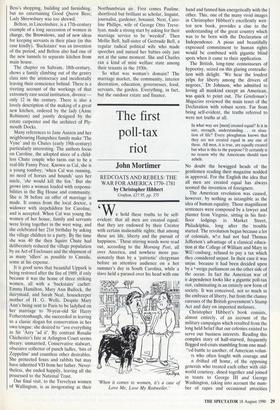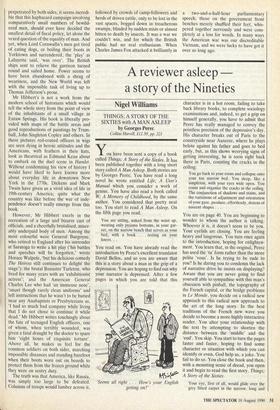The first poll-tax riot
John Mortimer
REDCOATS AND REBELS: THE WAR FOR AMERICA 1770-1781 by Christopher Hibbert Grafton, £17.95, pp. 375 Nve hold these truths to be self- evident: that all men are created equal; that they are endowed by their Creator with certain inalienable rights; that among these are life, liberty and the pursuit of happiness.' These stirring words were read out, according to the Morning Post, all over America, and nowhere more pas- sionately than by a 'patriotic' clergyman before an attentive audience on a hot summer's day in South Carolina, while a slave held a parasol over his head with one 'When it comes to women, it's a case of Love Me, Love My Rottweiler.' hand and fanned him energetically with the other. This, one of the many vivid images in Christopher Hibbert's excellently writ- ten new book, provides a clue to the understanding of the great country which was to be born with the Declaration of Independence. A pious and beautifully expressed commitment to human rights would be combined with gigantic blind spots when it came to their application.
The British, long-time connoisseurs of hypocrisy, seized on this glaring contradic- tion with delight. 'We hear the loudest yelps for liberty among the drivers of negroes,' Dr Johnson, who admitted to loving all mankind except an American, was quick to point out. The Gentleman's Magazine reviewed the main tenet of the Declaration with robust scorn. Far from being self-evident, the truths referred to were not truths at all.
In what way are [men] created equal? Is it in size, strength, understanding . . . or situa- tion of life? Every ploughman knows that they are not created equal in any one of these. All men, it is true, are equally created but what is this to the purpose? It certainly is no reason why the Americans should turn rebels.
No doubt the bewigged heads of the gentlemen reading their magazine nodded in approval. For the English the idea that all men are created equal has always seemed the invention of foreigners.
The American revolution was caused, however, by nothing as intangible as the idea of human equality. Those magnificent sentences were composed by a lawyer and planter from Virginia, sitting in his first- floor lodgings in Market Street, Philadelphia, long after the trouble started. The revolution began because a lot of colonials, who had not had Thomas Jefferson's advantage of a classical educa- tion at the College of William and Mary in Wil:ilmsburg, refused to pay a tax which they considered unjust. In their case it was unjus because it had been decided upon by a 4,)reign parliament on the other side of the ocean. In fact the American war of ir dependence looks like a gigantic poll-tax riot, culminating in an entirely new form of society. It was conceived, not so much in the embrace of liberty, but from the clumsy caresses of the British government's Stamp Act and duty on imported molasses.
Christopher Hibbert's book consists, almost entirely, of an account of the military campaigns which resulted from the long held belief that our colonies existed to serve our business interests. Reading this complex story of half-starved, frequently
flogged red-coats stumbling from one mud-
"ed battle to another, of American volun- rs who often fought with courage and n drifted off home, of the opposing generals who treated each other with old-
world courtesy, dined together and joined in toasts to George III and George Washington, taking into account the num- ber of rapes and occasional atrocities
perpetrated by both sides, it seems incredi- ble that this haphazard campaign involving comparatively small numbers of bewild- ered men, should ever have decided the smallest detail of fiscal policy, let alone the vexed question of the equality of man. And yet, when Lord Cornwallis's men got tired of eating dogs, or boiling their boots in Yorktown and surrendered, the 'play' as Lafayette said, 'was over'. The British ships sent to relieve the garrison turned round and sailed home. Power seems to have been abandoned with a shrug of weariness, and the New World was left with the impossible task of living up to Thomas Jefferson's prose.
Mr Hibbert's is not a work from the modern school of historians which would tell the whole story from the point of view of the inhabitants of a small village in Eutaw Springs. His book is liberally pro- vided with maps of the battle areas and good reproductions of paintings by Trum- bull, John Singleton Copley and others. In these pictures red-coated officers in wigs are seen dying in heroic attitudes and the Americans, with feathers in their hats, look as theatrical as Edmund Kean about to embark on the duel scene in Hamlet. Without condemning his view of history I would have liked to have known more about everyday life in downtown New York in the 1770s. Dickens and Mark Twain have given us a vivid idea of life in 19th-century America; quite what the country was like before the war of inde- pendence doesn't really emerge from this book.
However, Mr Hibbert excels in the recreation of a large and bizarre cast of officials, and a cheerfully brutalised, miser- ably underpaid body of men. Among the most colourful were General Burgoyne, who retired to England after his surrender at Saratoga to write a hit play ('his battles and speeches will be forgotten,' wrote Horace Walpole, 'but his delicious comedy The Heiress still continues to delight the stage'); the brutal Banastre Tarleton, who lived for many years with an 'exhibitionist actress'; and the American General Charles Lee who had 'an immense nose', 'smart though rarely clean uniforms' and left instructions that he wasn't to be buried near any Anabaptists or Presbyterians as, 'I had so much bad company while living that I do not chose to continue it while dead.' Mr Hibbert writes touchingly about the fate of teenaged English officers, one of whom, when terribly wounded, was given a fatal draught by the doctor to spare him 'eight hours of exquisite torture'. Above all, he makes us feel for the common soldiers on both sides, marching impossible distances and standing barefoot when their boots wore out on boards to protect them from the frozen ground while they were on sentry duty.
The truth was that America, like Russia, was simply too large to be defeated. Columns of troops would lumber across it, followed by crowds of camp-followers and herds of driven cattle, only to be lost in the vast spaces, bogged down in treacherous swamps, blinded by sudden mists or almost bitten to death by insects. It was a war we couldn't win, and for which the British public had no real enthusiasm. When Charles James Fox attacked it brilliantly in a two-and-a-half-hour parliamentary speech, those on the government front benches merely shuffled their feet, whis- pered together nervously and were com- pletely at a loss for words. In many ways the American war was our discreditable Vietnam, and we were lucky to have got it over so long ago.



























































 Previous page
Previous page